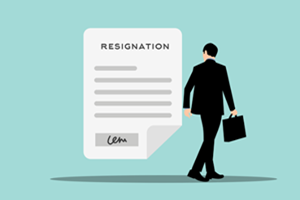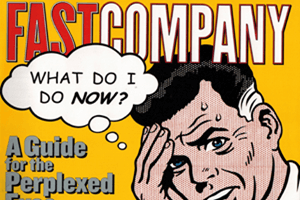Question
It’s always a relief when I get a job offer, but that’s also when I think I’m most vulnerable to accepting a job that maybe I should not. Face it, after 7, 8 or 9 interviews (common today), you just want to get it over with and start the job! You have said people often quit their jobs or get fired because “they took the wrong job to begin with.” I understand, but how do we avoid a mistake like that? Is there a strategy or a reminder I should write on my hand?
Nick’s Reply
 You can do something pretty obvious to avoid going to work for a questionable company or accepting the wrong job: meet everyone that will affect your success. It’s not really a strategy. It’s more of a tactic that will help you confirm a really good opportunity and keep you from getting a walk-on role in a nightmare. You shouldn’t write on your hand, but if you insist, write these two words: upstream and downstream.
You can do something pretty obvious to avoid going to work for a questionable company or accepting the wrong job: meet everyone that will affect your success. It’s not really a strategy. It’s more of a tactic that will help you confirm a really good opportunity and keep you from getting a walk-on role in a nightmare. You shouldn’t write on your hand, but if you insist, write these two words: upstream and downstream.
Look around the company
In a classic New York Times article, “How to Become a C.E.O.? The Quickest Path Is a Winding One” Guy Berger, a LinkedIn economist, says that to make it into a CEO job, “…you need to understand how the different parts of a company work and how they interact with each other and understand how other people do their job, even if it’s something you don’t know well enough to do yourself.”
That may seem obvious, but job candidates rarely take time to look around a company once they’re holding a brand new job offer. They’re understandably in a hurry to accept. While Irwin discusses a career strategy for becoming a CEO, I’m more concerned with the tactics necessary to be successful in any job — and that requires slowing down.
Before accepting a job offer
While I think job success is possible only when you pick the right company and job, what happens if you devote tons of time and effort to get a job offer, only to realize it’s wrong?
I teach all my job candidates to pause the hiring process when they receive an offer, and to re-start it on a new vector — one they’d never be able to insist on until they actually have an offer. For the sake of illustration, let’s say you’ve been offered a marketing job. Always, before accepting a job offer, take control politely but firmly and say this to the hiring manager:
“Before accepting your offer to start this job, I’d like to come back and meet three people who are upstream and downstream from the job you’ve offered: managers who run Sales, Product Development, and Manufacturing.”
(The actual departments will depend on the job you are considering.)
What’s upstream and downstream?
If you don’t get those meetings, you are likely to accept a wrong job, or to walk blindly into uncharted waters. Some companies will just refuse your request. Others will scratch their heads and ask why you want the meetings.
Here’s how to explain it:
“Those managers are upstream and downstream from the work I’ll be doing, and they will affect how successfully I can do my marketing job. Manufacturing is upstream from Marketing: They make what I must promote. Sales is downstream from me: They must rely on how I position our brand. Product Development is upstream — it creates features I have to communicate to the world. The upstream and downstream partnerships with Marketing affect how successful all of us can be. To make the commitment I’d like to make to you, I need to know who I’ll be working with, how they work, and what they expect from me. So I’d like to meet them now.”
An employer is more likely to consent to these meetings after it has made the commitment of a job offer to you.
Interview the employer
I know a sales manager who didn’t accept the job until he spent time in the warehouse — a downstream department whose work would determine customer satisfaction. He wanted to learn how orders were picked, packaged and delivered. He’d had bad experiences at another company where, no matter how much his sales reps sold, customers didn’t re-order because shipments arrived late and damaged. He also wanted to meet the accounting manager — another downstream job — who was responsible for receivables, because sales commissions aren’t paid until customers payments arrive.
So he interviewed the employer after he had their offer in hand.
Managers in other departments may have interviewed you during the hiring process, but did you interview them? Did you drill down into their business, meet their teams and perhaps spend half a day in working meetings with them?
No? Would you buy a company without doing exactly that — assessing its talent and management in a hands-on way? Then why would you accept a job without this kind of due diligence?
Your job success depends on others
Other people upstream and downstream from you will affect your job success dramatically — just as you will affect theirs. Meeting them and understanding what they do, and how, will help you decide whether to accept a job, and to avoid stepping into disaster and having to change jobs again soon.
This tactic also helps when you’re interviewing job candidates yourself — send them up- and downstream to other managers before you hire them. Is everyone convinced they can paddle in the right direction?
See also: How can I optimize my first day on the job?
Do you do anything special before accepting a job offer, to make sure it’s really right for you? Have you rushed into a job without due diligence only to find trouble waiting? What happened? What are some effective ways to help ensure you’ll enjoy success on a new job?
: :




 It’s hard enough to identify top job candidates and entice them into an interview, and even harder to hire them. The last thing you want to do is alienate a potential hire by subjecting them to an unpleasant, disrespectful interviewing process.
It’s hard enough to identify top job candidates and entice them into an interview, and even harder to hire them. The last thing you want to do is alienate a potential hire by subjecting them to an unpleasant, disrespectful interviewing process.
 There’s way to help your employer give you a raise before you give your resignation. Who wants to go on job interviews when a well-managed performance review might get you what you want? You can make a performance review pay off better than a job interview, if you seize it. That means you must trigger the review even before it’s scheduled. With many employers worried about losing workers, I’m going to suggest a way to pull this off.
There’s way to help your employer give you a raise before you give your resignation. Who wants to go on job interviews when a well-managed performance review might get you what you want? You can make a performance review pay off better than a job interview, if you seize it. That means you must trigger the review even before it’s scheduled. With many employers worried about losing workers, I’m going to suggest a way to pull this off.
 There used to be a book titled something like 2,800 Interview Questions & Answers. Even today, you can find books that will automate your job interviews with canned repartee. These books feature 701 interview questions (and “best answers), or 201, or 189, 101 — or, How many interview questions you got???
There used to be a book titled something like 2,800 Interview Questions & Answers. Even today, you can find books that will automate your job interviews with canned repartee. These books feature 701 interview questions (and “best answers), or 201, or 189, 101 — or, How many interview questions you got???